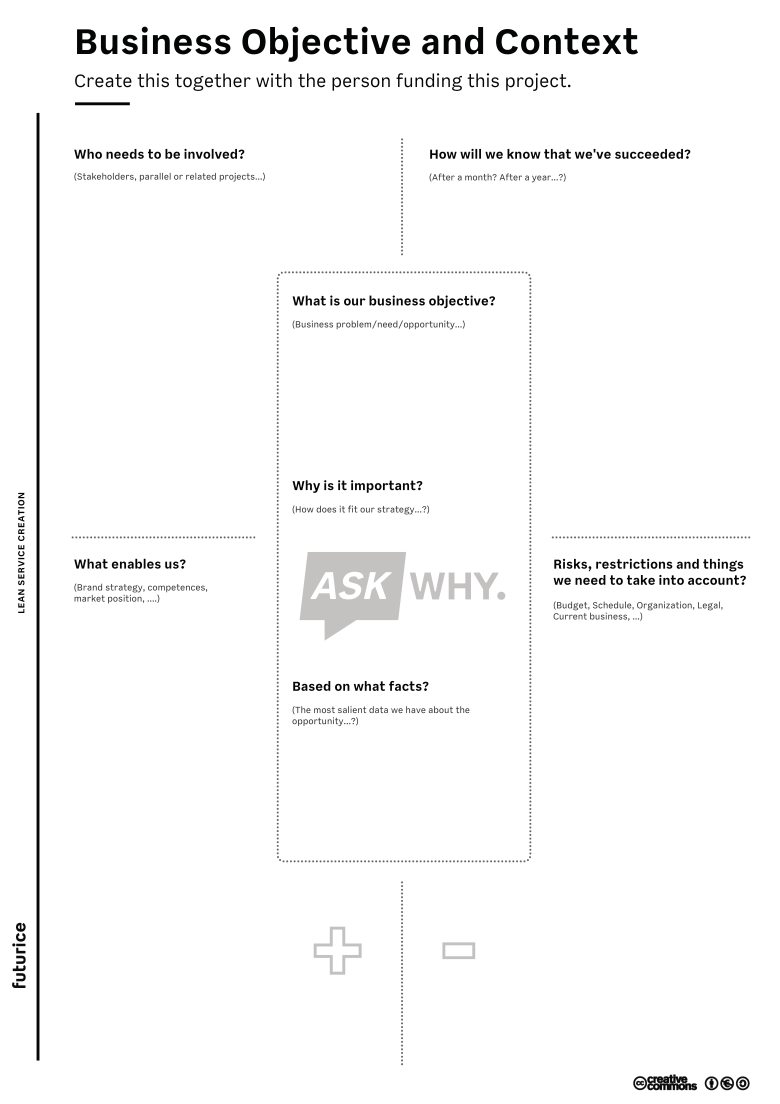Asking why. 7 questions to uncover real business objectives
Why are we doing this? It’s a powerful question, if you really put time into thinking about it – and answer honestly.
I’m often in discussions with organisations at a very early stage, when they’re still looking for clarity about what they want to achieve. In these discussions, I find it really helpful to go back to basics. This means that before people get fixated on a particular solution – an app or website for example – it pays to interrogate assumptions at a really granular level. Whatever it is you want to do, the end result should always be more than just a product.
I’ve put together here the early, simple and often most illuminating questions we ask when trying to understand a business objective with a client. This sometimes throws up surprises – good and bad. I’ve used these, for example, to shift a groups’ focus from chasing a VR product before they’ve really understood the problems to be solved within their organisation. It is always hugely valuable, and it’s a cornerstone of our approach to co-creating products and services in the right way for the right reasons. We make this systematic and repeatable, and these questions form a key part of our Lean Service Creation process. One of our tried and tested canvases is below, and you can find the rest here. Free and open source, as it should be!
We don’t have all the answers, but that’s exactly the point – it’s through a structured, honest and transparent questioning of an idea that the most progress is made. In my experience, running through these questions with an engaged and cross-functional team always flushes out untested assumptions and gets people thinking differently.
What Is Our Business Objective?
What result are you targeting? What’s the problem, need or opportunity at your company that needs addressing? The answer could be any manner of different things from improving internal business processes to reducing customer dissatisfaction. A good business objective does not imply a pre-defined solution. This should be an objective that can be solved in many different ways.
Why Is It Important?
You should be doing something that has real value and creates a positive business impact. How does it fit your company’s strategy? Your department’s strategy? Are there other reasons why this particular business objective is more important than others?
Based On What Facts?
What data do you have to back all this up? This is about facts over opinions. This question is helpful in two ways: it ensures (usually!) that validates the need to actively delivery the project and, most importantly, it carves out common ground for the team and management.
Who Needs To Be Involved?
It’s not just about the people in the room on the day. There will be other people to keep onboard. Who are the internal stakeholders? People on other projects who can share insight? Third parties who are essential in providing a service to the customer? Brand and marketing?
How Will We Know That We Have Succeeded?
One year from now, how do you know that you succeeded in achieving the business objective? Number of customers? Reduced operating costs? Profit uplift? Twelve percent growth? A shiny award and external recognition? What is it, and does your team agree? Next, answer the same question for one month from now. Think about the process. How will you know your project is proceeding smoothly?
 Find the full set of canvases to download here - leanservicecreation.com/canvases
Find the full set of canvases to download here - leanservicecreation.com/canvases
What Enables Us?
Are there unique capabilities or resources that give your team or company an advantage? Do you have particular market insights, customer data or powerful infrastructure? Think about what’s uniquely helpful for you – and what type of resource it is.
Risks, Restrictions and Things We Need To Take Into Account
Limited budget? Is the schedule scarily tight? Do you see problems with a huge unwieldy bureaucracy? Internal stakeholder overload? Maybe, your current business model is simply performing too well to support risk-taking. Do you know (or think you know) that your team lacks certain skills?
If you'd like to talk to me about defining, refining or straight-up finding your business objectives, get in touch david.mitchell@futurice.com
 David MitchellChief Growth Officer
David MitchellChief Growth Officer


